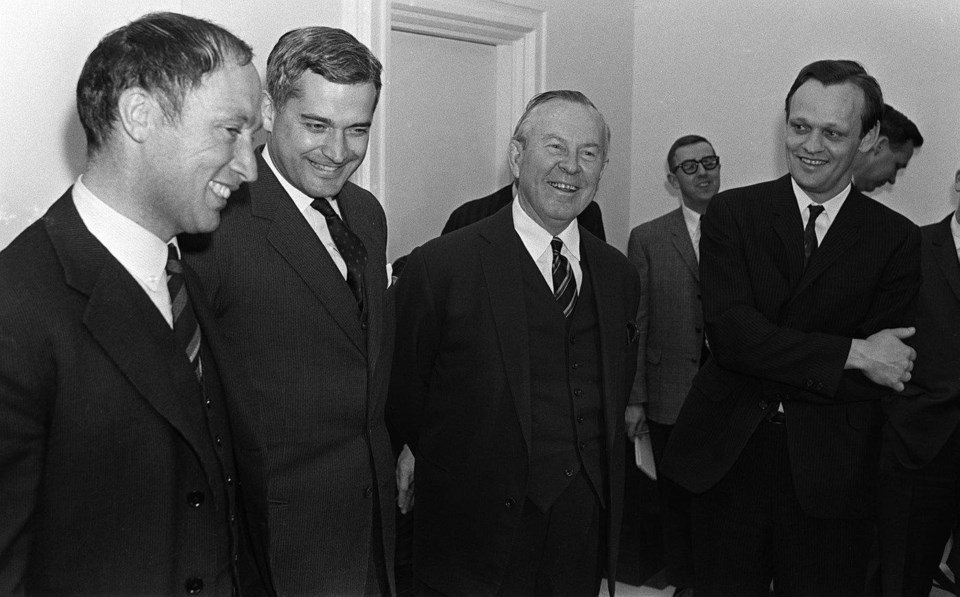OTTAWA — Prime Minister Justin Trudeau's minority government is expected to face its first serious test this week since the NDP withdrew from an agreement to support the Liberals.
Conservative Leader Pierre Poilievre has put forward a motion stating the House of Commons has no confidence in the prime minister or the government. Members will debate the motion on Tuesday and vote on it Wednesday.
The New Democrats and Bloc Québécois have said they intend to vote against the motion, avoiding a general election.
What is a minority government?
A minority government lacks a majority of the members of the House of Commons, meaning it depends on support from members of other parties to pass legislation, including budgetary measures.
Are minority governments a rarity?
They're actually quite common. Thirteen minority governments have emerged from federal elections. Two others were a result of governments being replaced between elections. (However, Parliament did not meet during one of the two, the government of Alexander Mackenzie, who soon went on to win a majority.)
Justin Trudeau has presided over two minorities, as did his predecessor, Stephen Harper.
How do they work?
There have been no coalition governments arising from a minority scenario at the federal level.
However, until recently the Liberals and NDP had a supply-and-confidence deal that would keep the minority government led by Trudeau in power and ensure progress on some mutually agreeable policies.
In addition, between 1972 and 1974, the NDP had an informal understanding with the Liberals that kept the government of Pierre Trudeau, Justin's father, in place.
More common are minority governments that secure support for key votes on an ad hoc basis.
Minority governments have also been known to act as if they held a majority, notably the Progressive Conservative governments of John Diefenbaker in the 1950s and '60s and Joe Clark in 1979, as well as the early period of Lester B. Pearson's Liberal government in the '60s.
Do minority governments last as long as majority ones?
Generally, no. A minority government could make it to the end of a traditional four-year mandate. However, they are often defeated on an important vote in the House or pull the plug themselves with the aim of securing a stronger mandate at the ballot box.
The length of minority governments varies dramatically, from the brief tenure of Arthur Meighen's Conservatives in 1926 to the stint of more than three years and seven months of William Lyon Mackenzie King's Liberals from 1921-25.
How do minority governments end?
Parliamentary practice and tradition dictate that if the government is defeated in the House on a question of confidence, voters head to the polls.
"What constitutes a question of confidence in the government varies with the circumstances," says the authoritative volume "House of Commons Procedure and Practice."
"Confidence is not a matter of parliamentary procedure, nor is it something on which the Speaker can be asked to rule."
Does that mean losing a vote in the House spells the end of a minority government?
No. Minority governments of Pearson and Pierre Trudeau each lost a number of votes in House without resigning.
A confidence motion may be clearly worded like the one the Conservatives have proposed this week. It could be a motion on a matter the government declares a question of confidence, or it might be related to government budgetary policy or the reply to the Speech from the Throne.
Even so, Pearson lost a vote on a budget matter but survived upon seeking, and winning, on a clear vote of confidence.
Has there been a particularly memorable defeat for a minority government?
Papers were tossed into the air in the House after Clark's government fell in 1979 in a 139-133 vote on its budget.
"Only six months ago, 91‘≠¥¥s voted to change the government of Canada because they wanted to change the direction of this country," Clark told a news conference after the vote. "By their action tonight, the opposition parties are saying that 91‘≠¥¥s were wrong to make that decision."
However, the defeat set the stage for the early 1980 return of the Liberals led by Pierre Trudeau with a majority mandate.
(Sources: Transition to the 44th Parliament: Questions and Answers by Andre Barnes and Laurence Brosseau of the Library of Parliament; House of Commons Procedure and Practice, third edition; The 91‘≠¥¥ Encyclopedia.)
This report by The 91‘≠¥¥ Press was first published Sept. 24, 2024.
Jim Bronskill, The 91‘≠¥¥ Press



